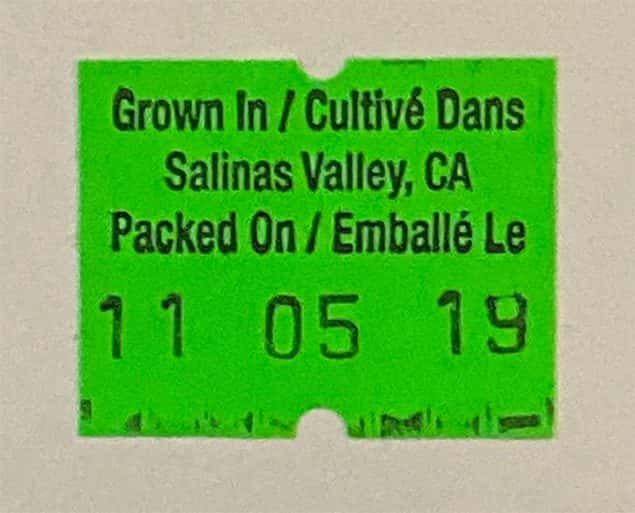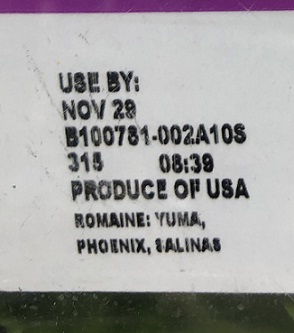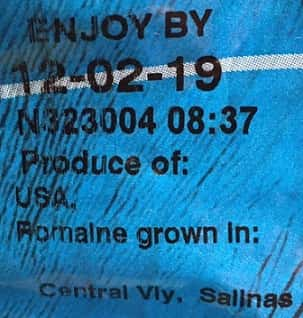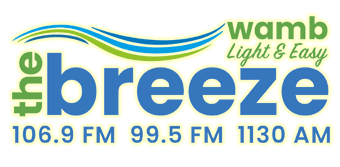
WASHINGTON D.C. – More than 75,000 pounds of salad products are being recalled after an E. coli outbreak infected at least 17 people.
Missa Bay, LLC said that the lettuce in these products, which also contain chicken or other meat, could be contaminated. Health officials tested a Ready Pac brand chicken Caesar salad and found it positive for E. coli on Thursday, the USDA news release said.
The items in question were shipped to distribution locations in Alabama, Connecticut, Florida, Georgia, Illinois, Indiana, Louisiana, Maine, Maryland, Massachusetts, Michigan, Minnesota, Mississippi, Missouri, New Jersey, New York, North Carolina, Ohio, Pennsylvania, South Carolina, Virginia, and Wisconsin.



Based on new information, CDC is advising that consumers not eat and retailers not sell any romaine lettuce harvested from the Salinas, California growing region.
- Most romaine lettuce products are labeled with a harvest location showing where they were grown.
- This advice includes all types of romaine lettuce harvested from Salinas, California such as whole heads of romaine, hearts of romaine, and packages of precut lettuce and salad mixes which contain romaine, including baby romaine, spring mix, and Caesar salad.
- If you have romaine lettuce at home:
- Look for a label showing where the romaine lettuce was grown. It may be printed on the package or on a sticker.
- If the label says “Salinas” (whether alone or with the name of another location), don’t eat it, and throw it away.
- If it isn’t labeled with a growing region, don’t eat it, and throw it away.
- If you don’t know if the lettuce is romaine or whether a salad mix contains romaine, don’t eat it, and throw it away.
- Wash and sanitize drawers or shelves in refrigerators where romaine lettuce was stored. Follow these five steps to clean your refrigerator.
- If you are buying romaine lettuce at a store:
- Look for a label showing where the romaine lettuce was grown. It may be printed on the package or on a sticker.
- If the label says “Salinas” (whether alone or with the name of another location), don’t buy it.
- If it isn’t labeled with a growing region, don’t buy it.
- Restaurants and retailers should check the label on bags or boxes of romaine lettuce, or ask their suppliers about the source of their romaine lettuce.
- Look for a label showing where the romaine lettuce was grown. It may be printed on the package or on a sticker.
- If the label says “Salinas” (whether alone or with the name of another location), don’t sell or serve it.
- If it isn’t labeled with a growing region, don’t sell or serve it.
- Suppliers, distributors, and others in the supply chain should not ship or sell romaine harvested in Salinas, California.
On November 21, 2019, Missa Bay, LLC, recalledexternal icon salad products due to possible E. coli contamination.
Do not eat or sell any of the recalled salad products, which were sold under many different brand names.
- The recalled salad products have “Use By” dates ranging from October 29, 2019, to November 1, 2019.
- The recalled products have establishment number “EST. 18502B” inside the USDA mark of inspection.
- Visit the USDA website pdf icon[PDF – 1 page]external icon for a full list of recalled products.
- This recall includes salad products that contained contaminated romaine lettuce. The romaine lettuce was tested by the Maryland Department of Health as part of a foodborne illness outbreak in Maryland.
Take action if you have symptoms of an E. coli infection.
- Talk to your healthcare provider.
- Write down what you ate in the week before you started to get sick.
- Report your illness to your local health department.
- Assist public health investigators by answering questions about your illness.
- Prevent infections in others by practicing proper hygiene, especially good hand washing.

